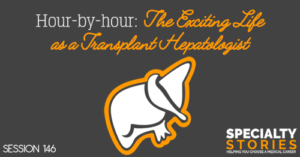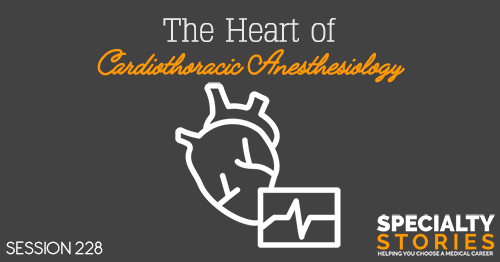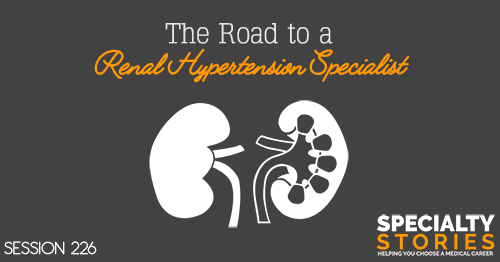Apple Podcasts | Google Podcasts

Session 146
Dr. Avash Kalra is a community transplant hepatologist that enjoys a busy, but exciting lifestyle. We talk about the path to transplant hepatology, myths, and more! Avash has been out of training now for seven years.
For more podcast resources to help you along your journey to medical school and beyond, check out Meded Media. If you want to learn more about transplant hepatology, check out the following American Association for the Study of Liver Diseases and the International Liver Transplantation Society.
Listen to this podcast episode with the player above, or keep reading for the highlights and takeaway points.
[01:22] Interest in Transplant Hepatology
Avash was first interested in transplant hepatology way back in medical school. At some point during medical school, he wanted to do gastroenterology and he hadn’t really considered hepatology or transplant at all.
“So much of what we end up doing in their careers is shaped just simply by the experiences we have or the people we're exposed to.”Click To TweetOne of their professors in family medicine at their medical school, had a pancreas transplant. And he heard this story a few years before he started medical school. They had a podcast back then in their medical school and they had that professor on and they talked about it. That was the first time that he really explored the possibility of transplant. Eventually, it led into exploring the field of transplant hepatology.
Avash trained in residency and fellowship which was a major Liver Transplant Program at the center that did the first ever successful liver transplant in 1973. So he got exposed to that history. And it’s a pretty cool field because it’s pretty new in all of medicine.
It wasn’t really until the 90’s that with advances in immunosuppression that outcomes for patients with liver transplants improved significantly. So when you think of the whole history of medicine, the modern era of transplant Is 30 years old now which is pretty amazing. So it’s nice to be in a field that’s new and growing.
[03:34] Transplant Hepatologist vs. Transplant Surgeon
Transplant hepatology is after medical school residency and internal medicine fellowship, gastroenterology fellowship. Sometimes their patients will ask him whether he’s doing the surgery and he’ll joke with them that that’s the last thing that they want.
Because that’s done by a transplant surgeon who does a transplant surgery training following general surgery training.
“We work very closely obviously with the transplant surgeon, but we are different.”Click To TweetTransplant hepatologists manage patients with chronic liver disease, both before and after transplant. They see patients with general liver disease issues unrelated to transplant as well. But their specialty certainly focuses on the transplant population.
They’ll be taking care of them during the evaluation process while they’re on the transplant list. They essentially manage every aspect of management regarding their liver disease. Then that will transition certainly after transplant to a different set of issues like managing immune suppression, and avoiding or managing any potential post transplant complications.
[05:42] Biggest Misconceptions Around Transplant Hepatology
One is a misconception that all liver disease is related to alcohol use.
Cirrhosis is advanced fibrosis or scarring of the liver. When they’ve developed that, sometimes they’ll recoil and they’ve never had a drop of alcohol. However, there are actually dozens of causes of chronic liver disease.
But in addition to alcohol, there are viral infections, like just hepatitis B and C. There are non alcoholic causes of cirrhosis such as fatty liver disease, which is actually the number one indication for liver transplant in the United States, surpassing
“Non-alcoholic fatty liver disease is quickly becoming the number one indication for liver transplant in the United States, surpassing even alcohol and hepatitis C.”Click To TweetSo it speaks to a changing landscape of what causes liver disease in the first place. There are also some autoimmune and genetic diseases as well that are less common that they always check for.
The second misconception is that when you’re listed for a liver transplant, there will somehow be an aspect of waiting time while you’re on the transplant list. And the way that transplant works in the United States is that it’s a sickest first policy.
People are listed for transplant based on their MELD score, which stands for the model for end stage liver disease. The higher the number, the worse their liver function, the higher they are on the list. So waiting time, as a result, doesn’t go into it. And that reflects the supply demand disparity that is the reality of transplant.
There are roughly 6,000-7,000 transplants done in the United States every year. But at any given time, there are over 15,000 people on the waiting list. In 2016, almost 3,000 patients died while they were on the liver transplant waiting list or removed for becoming too sick to undergo a transplant.
“There are some of the sickest patients in all of medicine but waiting time doesn't go into the calculation for being in the list.”Click To Tweet[08:30] Traits that Lead to Becoming a Good Transplant Hepatologist
For people who want to go into transplant hepatology, be ready for a variety of clinical scenarios to work in. On any given day, Avash might round on patients in the hospital in the morning. And then he might go to the endoscopy lab and perform a few procedures. Then he might see patients in the clinic in the afternoon who are both pre and post transplant. So you’re basically seeing the full gamut of scenarios just in one day.
“You have to be detail oriented. It's one of the more high stakes kinds of fields because these patients are sick.”Click To TweetYou have to be willing to and comfortable with dealing with very sick and complicated patients. To get into transplant hepatology, you have to do gastroenterology first. You also have to be procedurally oriented because you will be performing endoscopies and liver biopsies and other procedures on a daily basis. You need to be inclined to perform medical procedures.
Almost none of physicians who enter a gastroenterology fellowship have performed an endoscopy before they start fellowship. It’s not something that’s typically done in medical school or in residency training. But with practice, the procedure can be picked up by everyone within a few months and then mastered through the rest of fellowship and certainly in your career as well.
There are more advanced complicated GI procedures that do require additional training. But for someone going into hepatology, the most common ones are an upper endoscopy and colonoscopy. Those can be learned by any position entering a fellowship. So that’s not something to worry about too much before going into the field in the first place.
[11:42] Typical Day
Avash likes to joke that he takes things hour by hour as he’s never quite sure what’s going to happen next. He might see patients in the hospital or the clinic. And certainly, details of a schedule might change depending on what type of job someone has or which hospital they’re at.
Most hepatologists will spend some time seeing patients in the hospital, sometimes seeing patients in the clinic, and sometimes during procedures. That time will be split up during the week or day/ It’s going to vary. But it’s possible to be doing all those on one day.
“It's a busy job without question. When you get more and more sub-specialized in hepatology certainly, you end up not being as many of you in the surrounding area.”Click To TweetYou might get a lot of referral calls from out of hospitals that don’t have a hepatologist or don’t have a transplant center. Then you spend additional time guiding other hospitals or other physicians through cases, sometimes even recommending transferring those patients to your center to further care.
[14:21] Community vs Academic Setting
Avash did his training at University of Colorado and did his residency and fellowship in transplant hepatology fellowship there for seven years. Then he went to Presbyterian St. Luke’s which is essentially the only other transplant center in all of Colorado.
It is a newer transplant program started in 2015. When it comes to transplant, it’s a tertiary care service. And no matter where it delivered, or provided, the reason that he took this job at Presbyterian St. Luke’s is that he’s very academically oriented and actually still gets to do the traditional academic type things. They have medical students, residents, fellows so he still has an opportunity to teach.
To him, academic environments mean that everybody is providing care in an evidence-based manner, and is up to date on the evidence and literature which they do at the institution.
[16:26] The Training Path
You do the internal medicine residency program for three years.
If you’re going into residency knowing you want to do hepatology, try to find a school that offers fellowship or whether there are those kinds of doctors nearby so you get that exposure. The GI fellowship is three years and then followed by a one-year transplant hepatology fellowship. Then you take a separate board exam in transplant hepatology.
The transplant field is growing and it’s a very exciting field because things change a lot even in the short term.
As Avash said earlier, the modern era of transplant is only less than 30 years old. The data or experiences gathered by liver transplant centers over the course of two or three years, could shape the next decade of practice.
And even though you’re in fellowship or training for a long time before you get here, you’re still providing a lot of care and it’s still rewarding.
[19:06] Taking Calls and Life Outside of the Hospital
Generally speaking, most transplant hepatology programs will have anywhere from 2-9 hepatologists. The average is probably five or six, and they have three at their center. That means he’s on call a third of the time. This speaks to the frequency of calls that he gets from outside facilities.
If he’s on call and he has to come into the hospital, it’s usually for something emergent that he can help with. Although he doesn’t mind that aspect of it, it’s something to consider though. This is something you can navigate as you’re looking for jobs after a fellowship because you can directly compare hepatology positions.
Avash still gets to have a life outside of the hospital. He thinks it’s important to weigh the balance of work and life. He has a family so he makes sure he gets home for dinner and spends time with his kids.
“The field is competitive in the sense that there aren't a lot of transplant hepatology positions.”Click To TweetBecause transplant hepatology is sub-specialized, you also have less people going into it. Consequently, a lot of fellowship programs are changing the model a little bit. Some programs are offering a system where you can actually consolidate your three GI years into two. And then you do a transplant hepatology fellowship as what would have been your third year for people. At least, this cuts out a year and avoids the need for applying for another one-year position somewhere.
[22:53] Further Opportunities to Subspecialize
Clinically, there is none. But there are multiple opportunities that can open up. In addition to being involved locally at your transplant center, there certainly are opportunities to be involved in administrative roles or policy.
The way that transplant is set up in the U.S. is that there are transplant centers throughout the country that have split arbitrarily, but geographically.
For example, Colorado and surrounding states are referred to as Region 8. And there are a total of 11 regions in the country. Each region manages their own center within the larger umbrella of the United Network for Organ Sharing which is the main transplant governing body.
Within each region, there’s opportunity to change policy and contribute to a variety of issues. Each region has meetings a couple times a year. So it’s possible to still be involved in other areas of medicine that aren’t clinical.
[24:57] What He Would Have Told HImself Earlier On
Avash says it’s all worth it at the end. No matter what field people go into, there are days in residency you’re on call for overnight or over 24 hours and you’re sleep deprived and dealing with a complex situation.
There’s a whole field of literature about the issue of burnout in medicine. And it’s common to feel it. Most trainees feel it at some point. And it’s more normalized now. There’s more focus on resident and fellow wellness issues like that.
“It's a process that is trying but worth it in the end.”Click To TweetKeeping the long term or big picture in mind is important. And that speaks to the balance that we talked about, too. As a resident and as a fellow, it’s just the reality of how medical training is and trying to find the time to focus on life outside of work.
[27:10] Message to Future Primary Care Physicians
It’s easier to treat hepatitis C now than it was before. There’s a lot that goes into the decision to treat a patient with decompensated cirrhosis that results in complications. And he thinks those patients should be referred before actually starting hepatitis C treatment and discuss the appropriateness and timing of treatment. That’s one issue.
Another common issue is for patients with alcoholic liver disease. They need to get counseling or rehab programs or a program where they get screened for alcohol or encouraged sobriety. Even before they see a liver doctor because some of those patients are being considered for transplant and they need some period of sobriety before they get there.
The last issue is that primary care doctors commonly see patients with fatty liver disease and a lot of it can be picked up as a clue on abnormal liver tests. From time to time, he might hear a patient tell him they’ve had abnormal liver tests checked by their primary care doc years ago. They’re told it was abnormal and maybe it’s fatty liver. Then they don’t show up to him years later until they have cirrhosis.
“Primary care physicians need to think about which patients transplant hepatologists should be seeing sooner.” Click To Tweet[29:34] The Most and Least Liked Things About Transplant Hepatology
Avash likes the variety of cases that comes to him. He likes the pathophysiology of liver disease and the complexities surrounding transplant. Second, he loves the people he gets to work with and he’s taking care of these patients. So it’s a multidisciplinary field.
They work with surgeons, dieticians, interventional radiologists, and psychiatrists, and certainly, primary care doctors and GI doctors every day. Sometimes, he sees all of them for one patient in a single day.
“Having that multidisciplinary nature of care is important and rewarding.”Click To TweetAvash finds it cool to see a patient after transplant who is sick and on the verge of dying just months prior. It’s something that is humbling and rewarding.
Conversely, there’s nothing that comes to mind that he dislikes about the least, maybe except for the electronic medical records.
[31:45] Major Changes Coming in the Field
If he’d have to do it all over again, then he would still have chosen the field. In terms of major changes coming in the field, there have been so many advancements and care for patients both before and after transplant that the field now is unrecognizable from the field 20 years ago. So it’s always going to change.
[33:24] Final Words of Wisdom
If you’re thinking about GI and hepatology specifically, the key is to try to see as many clinical scenarios as possible. Most of medical training as a medical student during clinical rotations, for example, is spent in the hospital. And patients in the hospital with chronic liver disease are very sick. Some of them don’t make it and it can be really trying from an emotional standpoint.
It wasn’t really until he was a resident and seeing patients in hepatology clinics that he saw the difference between a patient in a clinic and a patient in the hospital.
The goal obviously is to keep patients out of the hospital. When you’re in training, you’re seeing a very selected group of people who are very sick to the point that they’ve been hospitalized. And that’s not a lot.
“When you're seeing subspecialties as a trainee, you're really not seeing the whole picture if you're just seeing the patients in the hospital.”Click To TweetSo if you think you might be interested in it, try to reach out to a transplant hepatologist and ask if you could come over once a month or whenever you’re able to so you could get additional exposure. If you’re interested in something, sometimes it’s about seeking out your potential mentors. Ultimately, try to gain as much experience as you can.
Links:
American Association for the Study of Liver Diseases
SEARCH SITE
LISTEN FOR FREE











